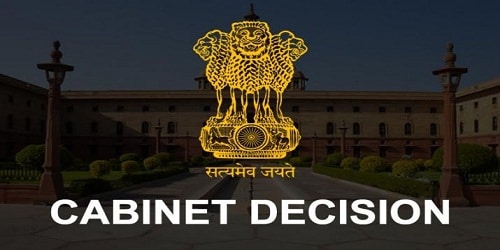Cabinet approved hike in MSP for all Kharif Crops for 2019-20
The Cabinet Committee on Economic Affairs (CCEA) chaired by Prime Minister Narendra Modi approved the increase in the Minimum Support Prices (MSPs) for all kharif crops for 2019-20 Season. The MSPs for all kharif crops for 2019-20 season is as follows:
The MSPs for all kharif crops for 2019-20 season is as follows:
| Crop | MSP 2018-19 | MSP 2019-20 | Increase |
| Paddy (Common) | 1750 | 1815 | 65 |
| Paddy (Grade A) | 1770 | 1835 | 65 |
| Jowar (Hybrid) | 2430 | 2550 | 120 |
| Jowar (Maldandi) | 2450 | 2570 | 120 |
| Bajra | 1950 | 2000 | 50 |
| Ragi | 2897 | 3150 | 253 |
| Maize | 1700 | 1760 | 60 |
| Tur (Arhar) | 5675 | 5800 | 125 |
| Moong | 6975 | 7050 | 75 |
| Urad | 5600 | 5700 | 100 |
| Groundnut | 4890 | 5090 | 200 |
| Sunflower Seed | 5388 | 5650 | 262 |
| Soyabean (yellow) | 3399 | 3710 | 311 |
| Sesamum | 6249 | 6485 | 236 |
| Nigerseed | 5877 | 5940 | 63 |
| Cotton (Medium Staple) | 5150 | 5255 | 105 |
| Cotton (Long Staple) | 5450 | 5550 | 100 |
- The highest percentage return to farmers over their cost of production was for Bajra (85%) followed by urad (64%) and tur (60%).
- The new Umbrella Scheme “Pradhan Mantri Annadata Aay Sanrakshan Abhiyan” (PM-AASHA) which was announced in 2018 will provide remunerative returns to farmers for their produce. It includes 3 sub-schemes- Price Support Scheme (PSS), Price Deficiency Payment Scheme (PDPS) and Private Procurement & Stockist Scheme (PPSS) on a pilot basis.
- In the case of cereals including nutri-cereals, Food Corporation of India (FCI) and other designated State Agencies will continue to provide price support to the farmers.
- Competition Commission of India (CCI) is the central nodal agency for undertaking price support operations for Cotton. National Agricultural Cooperative Marketing Federation of India Ltd (NAFED) will supplement efforts of CCI for cotton procurement.
- NAFED, Small Farmers’ Agribusiness Consortium (SFAC) and other designated Central agencies will continue to undertake procurement of pulses and oilseeds.
Cabinet approved proposal for leasing out 3 airports through PPP
The Union Cabinet chaired by Prime Minister Narendra Modi approved the proposal for leasing out 3 airports namely Ahmedabad, Lucknow and Mangaluru of Airports Authority of India (AAI) through Public Private Partnership (PPP) to the highest bidder M/s. Adani Enterprises Ltd. It quoted the highest bid for operation, management and development under PPP for a lease period of 50 years as per the terms and conditions of the bid documents.
Cabinet approved Code on Wages Bill 2019
The Union Cabinet chaired by Prime Minister Narendra Modi approved the Code on Wages Bill 2019. It enables the Centre to fix minimum wages for the entire country and to subsume existing laws related to workers’ remuneration. It replaces the Payment of Wages Act, 1936, Minimum Wages Act, 1948, Payment of Bonus Act, 1965, and the Equal Remuneration Act, 1976.
- Description: The Code on Wages is one of the four codes that would subsume 44 labour laws with certain amendments to improve the ease of doing business and attract investment for spurring growth. The four codes will deal with wages, social security, industrial safety and welfare, and industrial relations.
- Powers: The central government will fix minimum wages for certain sectors, including railways and mines. The states also would be free to set minimum wages for other category of employment. It provides to set up a national minimum wage. The central government can set a separate minimum wage for different regions or states and the minimum wage should be revised every five years.
- Background: On August 10, 2017, Modi government had introduced the wages code bill in the Lok Sabha. The bill was referred to the Parliamentary Standing Committee and it submitted its report on December 18, 2018. But it was lapsed as the 16th Lok Sabha dissolved in May 2019.
Cabinet approved the introduction of Surrogacy (Regulation) Bill 2019
Cabinet approved the Surrogacy (Regulation) Bill, 2019 which aims to prohibit commercial surrogacy in India.
- Background: The Bill was passed in the Lower House but lapsed after it could not be passed in the Upper House at the end of the 16th Lok Sabha.
- Reason: The 228th report of the Commission of India recommended prohibiting commercial surrogacy and allow altruistic surrogacy by enacting suitable legislation. India emerged as a surrogacy hub for couples from other countries and there have been reports concerning unethical practices, exploitation of surrogate mothers, abandonment of children born out of surrogacy, and rackets involving intermediaries importing human embryos and gametes.
- Powers: The bill regulates surrogacy services in India to prohibit the potential exploitation of surrogate mothers and to protect the rights of children born through surrogacy. It has authorised to establish a National Surrogacy Board at the central level. The states and union territories will constitute state surrogacy boards.
- Applicability: The Bill will be applied to the entire country except for Jammu and Kashmir.
About Union Cabinet:
The Union Council of Ministers exercises executive authority in India. It consists of senior ministers, called cabinet ministers, junior ministers, called ministers of state and, rarely, deputy ministers. It is led by the Prime Minister.




